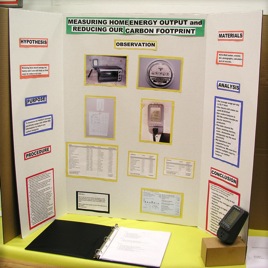In mid January, while attending the AAAS meeting, I got an email from a friend that her grandson (a 4th grader) “needed” to do some science research for school and that the research was competitive and he would like very much to win a prize. Could I help? My first thought was to try an environmental “Paper Clips” (June 11, 2012) in the form of an energy audit and calculation of a carbon footprint. I had no idea if this would work with a fourth grader, but decided to put forward the suggestion and see how it played out. Through interactions with the parents, grandparents and indirectly with the fourth grader, the project eventually took shape.
Here is the result, followed by a guest blog written by the kid’s mother:
Guest Blog Post: Randee Zerner:
My son, who is in the 4th grade, is required to participate in a science fair project. Last year, we did a composting project, were he received honorable mention. This year, his goal was to surpass that and win the chance to go to Brookhaven Labs. So naturally, we asked our friend Professor Tomkiewicz what environmental project he would suggest. The recommendation was an energy audit of our home, with ideas for ways to reduce our carbon footprint. We then asked another of my mother’s coworkers, and she suggested a study about snails. My son, being who he is, chose the more complex project.
For the next 6 weeks, the energy audit became the central activity of our home. We first had to list all of the light sources in all the rooms in the house and record the wattages for each bulb. In order to get a seven day average of our electricity usage, my son put a piece of paper on every light switch in the house. For seven days, every member of the family had to write down the time the light was turned on and off in every room. At first we had fun calling out to each other, “Did you write down the time?” As the days passed, at times, we either kept the lights on (A rare occurrence, since we are very conscious of turning off the lights when leaving a room), or did not turn them on at all. Which led to our going to the bathroom in the dark more often than not (for boys, not an easy task). Over time, we learned that the natural light during the day was usually sufficient for most activities.
My son used a Kill-A-Watt meter provided by Professor Tomkiewicz. We connected this device to our refrigerator, garage refrigerator, deep chest freezer, microwave, toaster, computer, TV/cable box, apple device charger, and telephone. We were unable to do this with the dishwasher, oven, washer and dryer, so we took the information from those appliances and asked our energy guru to help figure the kWh of these appliances.
Then the real fun began, and we did all of the math problems and converted the watts into kW and then into kWh (After figuring out the average time the lights were on). After many emails back and forth with Professor Tomkiewicz to make sure our formulas were right, we then figured out the sum of the kWh for both lights and appliances. At this point, we were calling our guru to check our work (Wondering if maybe, at this point, he regretted helping out?). We then compared our final sum of kWh usage to our electrical bill. The emails were going back and forth at a rapid pace – we were trying to show all of our work and to double-check everything. We were so proud of everything… and then our guru dropped the bomb: “Where is the carbon footprint?” At which point, my son and I looked at each other and said, “How do we figure that out?” As usual, we were then given yet another formula (I’m so happy my son loves math). My son then typed up some suggestions for us to do as a family to decrease our energy use.
The board was finally put together and handed in; we celebrated by leaving on some lights for a little while, (Shh, don’t tell anyone). Tuesday night, we went to school to see the board presented along with 100 others. Of course, we thought ours was the best, but we had to admit there were some other great projects. The teacher told my husband and me that she recommended our son’s project for honorable mention; been there, done that – hoping for more! We will find out tomorrow.
We would like to thank Professor Tomkiewicz for all of his time and patience, and most of all, for not screening his calls!!


You can email me.
Micha
Thanks for the awesome blog post. I’d like to know further
information on how you did this. Is there mode to contact you.
Itˇs actually a nice and helpful piece of info. I am happy that you shared this useful info with us. Please keep us informed like this. Thanks for sharing.
After looking over a handful of the blog posts on your site, I seriously like your way of blogging. I saved it to my bookmark webpage list and will be checking back soon. Take a look at my website too and let me know your opinion.